Transferts monétaires et mobilité humaine
Les transferts monétaires sont souvent utilisés lors de crises afin de répondre aux besoins des personnes migrantes. Dans cette page, vous trouverez des ressources sur les transferts monétaires et la migration.

La Croix-Rouge se prépare à fournir une aide humanitaire aux migrant·es de la caravane sur le point de quitter le Honduras pour le Guatemala.
©Johannes Chinchilla / FICR.
Conflits, crises économiques et catastrophes sont autant de raisons ayant contraint des personnes à fuir et à traverser des frontières dans des conditions éprouvantes et risquées, en quête de sécurité et de moyens de subsistance. En 2020, le nombre de personnes déplacées de force s’est envolé au niveau sans précédent de plus de 80 millions de personnes, soit près du double du nombre enregistré il y a une dizaine d’année. Cette tendance s’aggrave et les effets du changement climatique menacent de déplacer jusqu’à 200 millions de personnes d’ici 2050.
L’assistance monétaire est de plus en plus utilisée afin de répondre aux besoins des personnes en situation de déplacement. On y a eu recours à grande échelle dans différents contextes de migration, en Europe en 2015 jusqu’au Venezuela pour « los caminantes ». Elle a également été utilisée dans d’autres crises migratoires, notamment en Amérique centrale, au Sahel, en Méditerranée et dans la Corne de l’Afrique. L’assistance monétaire est à l’heure actuelle l’une des principales formes d’aide apportée aux populations déplacées en Ukraine et dans les pays voisins.
Il existe une myriade de perspectives et de définitions concernant le mot « migrant·e » et la façon dont les humanitaires doivent agir. C’est pourquoi nous ne choisissons pas une définition unique pour le moment, étant donné que les discussions sur l’assistance monétaire et la migration en sont encore à leurs prémices et que le langage évolue encore.
Documenter et partager les données probantes donnera lieu à des interventions plus efficaces. Cette page contient une sélection de ressources utiles concernant la migration et le recours à l’assistance monétaire. Elle sera mise à jour au fil des discussions ayant lieu dans les espaces humanitaires des transferts monétaires.
Priorités actuelles
Afin de contribuer aux progrès relatifs à cet enjeu, nous nous engageons à :
- soutenir la création de données probantes aux niveaux régional et mondial ;
- contribuer aux solutions pratiques visant à mettre en œuvre les transferts monétaires auprès des personnes migrantes ;
- organiser des discussions sur les enjeux majeurs basées sur des données probantes.
Contenu récent

Monitoring for MPGs: Nigeria
Guidelines and Tools
DRC partnered with graduate students from the Fletcher School at Tufts University, to design three quantitative and qualitative monitoring tools to gauge the effect of MPGs at household and community levels (namely household survey, key informant interview and community group discussion templates). This...

Interim Guidance Note on Determining Cash Transfers Values for Food Security
Guidelines and Tools
The objective of this guidance note, as laid out in the Terms of Reference, is to: Leverage FSC partners’ knowledge and experience to develop guidance on cash transfer value logic for both unconditional and relevant food security cash for work/assets3 programming. It focusses on acute food insecurity...

Policy Briefing: Electronic Transfers in Humanitarian Assistance and Uptake of Financial Services
Report
The Electronic Cash Transfer Learning Action Network (ELAN) undertook case studies on humanitarian electronic transfer (‘e-transfer’) projects in Ethiopia, Zimbabwe and Bangladesh. The case studies examine the extent to which: recipients used digital financial services (e.g. money transfers, savings,...

Cash or in-kind? Why not both? Response Analysis Lessons from Multimodal Programming
Report
This research reviews lessons learned about response analysis from multimodal responses, that is, responses in which practitioners determined that more than one response modality between cash,vouchers, and in-kind, was a “best fit” or in which the conclusions about “best fit” changed over...

Les Principes sur les Modalités des Transferts Monétaires en Urgence à Madagascar
Guides et outils
To improve coordination at technical and strategic levels, an emergency cash group was formed in 2016 under the overall umbrella of the Social Protection Thematic Group which was co-led by UNICEF and the Ministry in charge of social protection. This has strengthened coordination amongst partners; improved...

Rapid Assessment for market report : West Kenya and Informal settlements in Kenya.
Report
Two locations namely Mathare and Kibera slums in Nairobi as well as Kisumu, Migori and Homabay counties in West Kenya were affected by post election skirmishes after the Kenya General Elections of 8th August 2017. In September 2017 Kenya Red Cross conducted a post crisis market assessment to establish how...
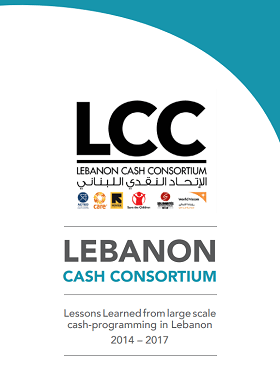
Lessons Learned from large scale cash programming in Lebanon 2014 – 2017
Report
Given the fact that cash is becoming an increasingly used modality in humanitarian
interventions, coupled with the evolution of the funding model for cash assistance in Lebanon, the former LCC agencies find it important to give to cash consortia and cash actors the benefit of the unique experience that...

Monitoring for MPGs: Ethiopia
Guidelines and Tools
DRC partnered with graduate students from the Fletcher School at Tufts University, to design three quantitative and qualitative monitoring tools to gauge the effect of MPGs at household and community levels (namely household survey, key informant interview and community group discussion templates). This...
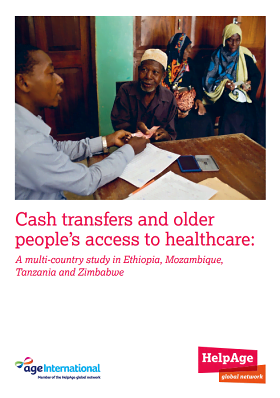
Cash Transfers and Older People’s Access to Healthcare: A Multi-Country Study in Ethiopia, Mozambique, Tanzania and Zimbabwe
Report
This report presents the findings of the Social Protection and Access to Health Services for Older People in Ethiopia, Mozambique, Tanzania and Zimbabwe study into the relationship between cash transfers and older people’s access to health services, carried out by Development Action on behalf of...

Cash alone is not enough: a smarter use of cash
Guidelines and Tools
Cash based interventions (CBIs) enable crisis affected people to make choices and prioritise their own needs. They also support markets critical to survival and recovery of communities. NRC is committed to increasing the use of cash across its programmes. Yet, cash based interventions are not a...

Workshop on Emergency Cash Transfer – Executive Summary
Rapport
During the past two years, partners in Madagascar have been supporting 13 different type of cash programs and have targeted about 1.2 million people. This multi-partner approach has created challenges for technical and institutional coordination. To improve coordination at technical and strategic levels,...

Scaling-up CTP in Somalia: Reflecting on the 2017 Drought Response
Report
This report summarises discussions that took place during a half-day workshop in September 2017. It built on issues identified as needing action in May, as outlined in the ‘Looking back to move forward: Building on learning from 2011 to strengthen the 2017 drought response in Somalia learning report’.
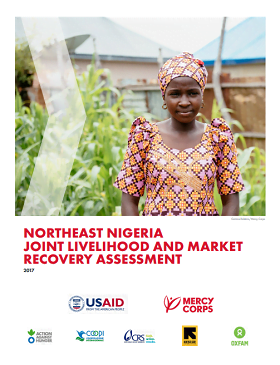
Northeast Nigeria joint livelihoods and market recovery assessment
Report
Mercy Corps Nigeria, in conjunction with Action Against Hunger, Cooperazione Internazionale, Catholic Relief Services, the International Rescue Committee and Oxfam undertook the assessment across the three most affected states in Northeast Nigeria; Adamawa, Borno and Yobe, to better understand...

A Review of Inter-Agency Collaboration for CTP Delivery
Report
Recent global initiatives have reaffirmed the potential for Cash-Transfer Programmes (CTP) to effectively and efficiently meet a wide range of disaster-affected populations’ needs while preserving dignity and choice. Although much work has been done in advocating for the benefits of CTP and enhancing...

Looking Back to Move Forward: Building on Learning from 2011 to Strengthen the 2017 Drought Response in Somalia Learning Report
Report
This report provides a summary of the discussions that took place during a half-day reflection workshop in May 2017. More than 40 people from national and international NGOs, the UN, donors and research organisations came together to consider lessons from the 2011 drought response, reflect on the use of...
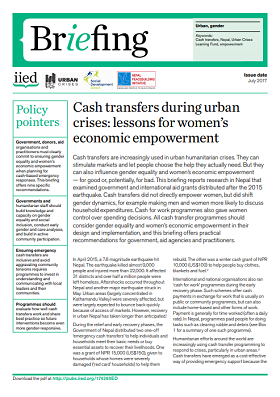
Cash Transfers During Urban Crises: Lessons for Women’s Economic Empowerment
Guidelines and Tools
Cash transfers are increasingly used in urban humanitarian crises. They can stimulate markets and let people choose the help they actually need. But they can also influence gender equality and women’s economic empowerment — for good or, potentially, for bad. This briefing reports research in Nepal...

Real time evaluation report for Kenya Red Cross Society
Report
After launching of its first Drought Emergency Appeal, Kenya Red Cross Society undertook a real time evaluation of its cash transfer response in May 2017 to find out what was working or not working in the KRCS emergency cash transfer response to enable decision making in the remaining period of the...

Is cash better than food vouchers for Syrian refugees?
Report
A comparative analysis of the effectiveness of unrestricted cash and food restricted voucher assistance modalities for Syrian refugee households’ food security in Jordan and Lebanon.

The Financial Journey of Refugees Full Report
Report
This document details how refugees and migrants from the Middle East, South and Central Asia and East, West and North Africa finance their journeys and manage money along the way.
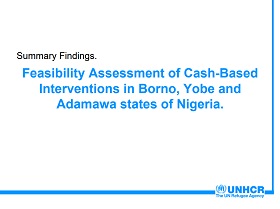
Feasibility Assessment of Cash-Based Interventions in Borno, Yobe and Adamawa states of Nigeria
Report
Outputs
• Analyse the feasibility and available response options for
potential CBIs covering basic needs, livelihoods and
support to vulnerable persons, and moving forward
toward MPGs
• Recommendations and action points……
• Support the Design of a CBI intervention and develop SOPs (2017)
•...